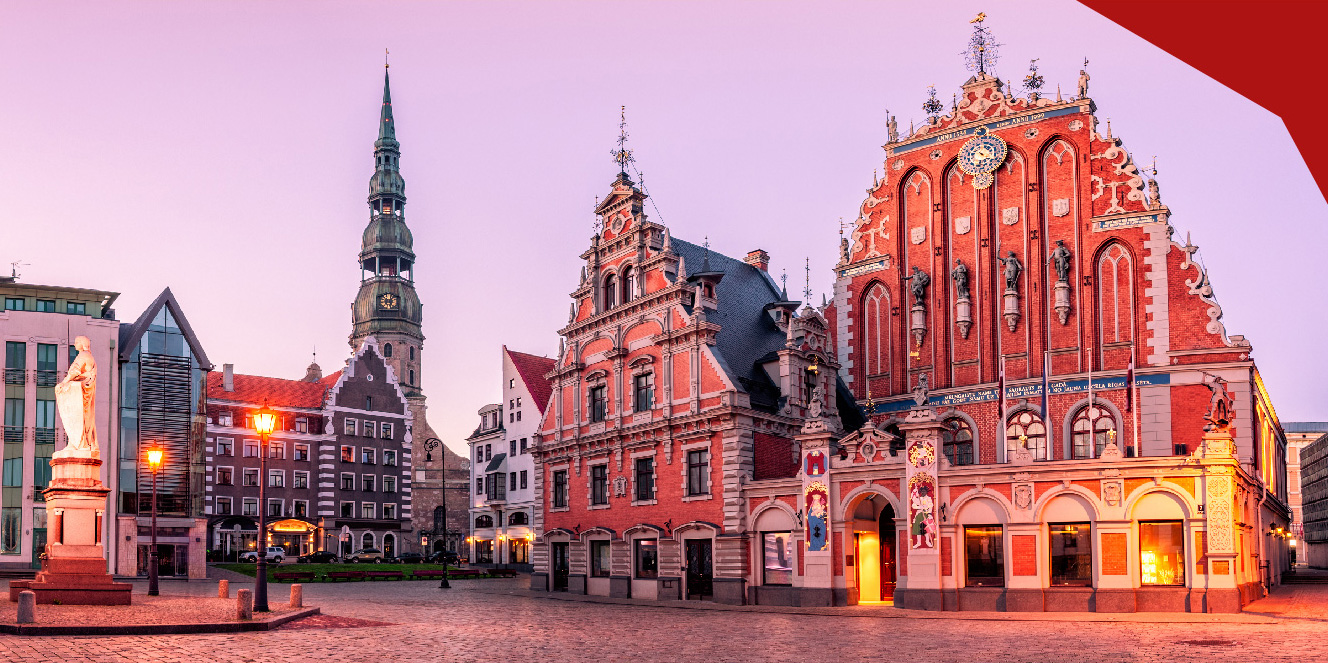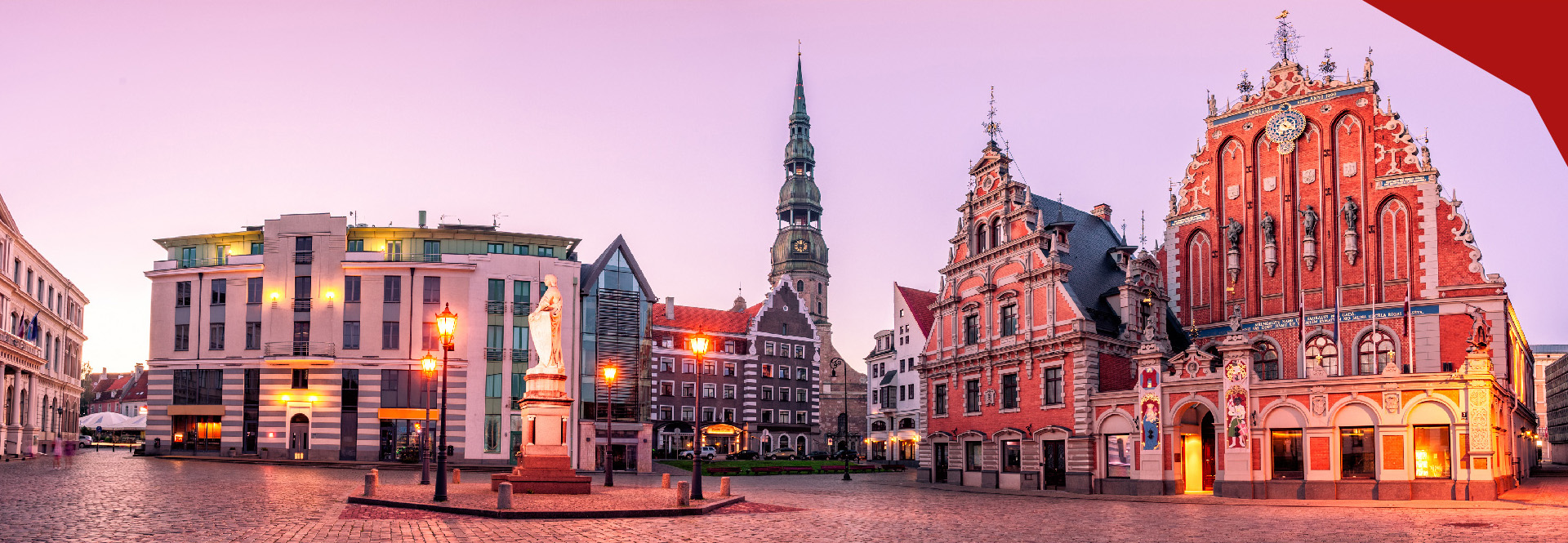About Latvia
The capital of Latvia also calls itself the capital of the Baltic. Riga is enriched and inspired every day by its multicultural heritage and it actually feels like a major European city.
In 1201 Riga was founded by the German Bishop Albert, even though the area was populated already long before. It is one of the oldest cities on the Baltic Sea. It is the geographical centre of the Baltic States. Due to its geographical location on the Baltic Sea, Riga has been an important centre of trade, finance and culture for centuries. Riga acquired the layout typical of German cities as Hanseatic League member. During the 800 years of its existence Riga has adopted much from Germany, Poland, Sweden, the Netherlands and other countries in crafts, education, social life and culture as well.
Latvia first gained independence after the First World War and lasted until the Second World War. It regained independence and joined NATO in 1991 and the EU in 2004. During the years of Soviet control, Riga was transformed into a major industrial and business centre. During that period Latvia’s population tripled, with the majority of the new inhabitants coming from Russia.
Now Riga has turned into a truly cosmopolitan European capital, with lots of different languages spoken in its streets. Besides Latvian as the official state language, Russian is the mother tongue for on third population. English and German are also widely spoken and youngsters speak Scandinavian or French as well.
Riga is filled with well-preserved medieval architecture of later periods, the urban structure, the richness and quality of Art Nouveau architecture and the 19th century wooden architecture of the city. The historical heart of Riga – Old Riga and central parts of the city are on the UNESCO World Heritage List.
Every year Riga hosts large international cultural festivals, and most proudly point out the largest – the National Song and Folk dance festival that is held every five years, for one week. It involves hundreds of choirs and folk dance groups, enchanting thousands in the audience. This Nationwide Celebration has earned high honor internationally, included on the UNESCO Oral History and Non-material Cultural Heritage List. The next Nationwide Latvian Song and Dance Celebration will be held in 2023.
We are more than sure when you get acquainted with this attracting and welcoming country, you’ll enjoy it as much as we do!
We have compiled a list of interesting facts about Latvia:
- One of the last corners of Europe to join Christendom, Latvians are still very much pagans at heart. They worship nature by jumping over bonfires at Midsummer Eve, and many surnames are about birds, animals or trees.
- Latvians are a people to look up to. Latvia has the world’s tallest women, with the average lady coming in at an impressive 170 cm. The men are no midgets either, holding fourth place.
- Riga’s Central Market one of Europe’s biggest markets. It is famous for its pavilions housed in giant zeppelin hangars. Those were left behind by the German army after World War I.
- With over 500 km of coast, Latvia has tons of beaches. There’s space for everyone, whether you want fun in the sun or miles of sand to yourself, and best of all its all open to the public.
- Over half Latvia’s territory is covered by forest, so we live in a very green place. We love to pick mushrooms and berries, and at Midsummer young couples duck into the woods to look for the mythical flowering fern. No such plant exists, but the search goes on..
- In Riga there are over 800 Art Nouveau buildings with one of the world’s greatest galleries of this joyful style. Alberta iela is a street almost entirely created by Art Nouveau genius Mikhail Eisenstein His son film director Sergei Eisenstein was one of the founders of modern cinema.
- Did you know that we love to sing? We are a Nation with over 1 million folk songs. You can catch over 10,000 Latvians on stage at once at the Song Festivals, and we are proud of our opera stars like Inese Galante, Elīna Garanča, Aleksandrs Antoņenko and Egils Siliņš who delight audiences at home and abroad.
- Latvia is one of the top 10 countries when it comes to internet speed. It has the world’s fourth fastest internet connections, and with over 800 free connection points in Riga. Latvia also holds the world record for the longest ever phone conversation, a 54 hour 4 minute marathon in 2012.
- You have to thank Latvian-born tailor Jacob Davis next time you put on a pair of jeans. In 1871 in Reno (Nevada) he invented denim as a tough material for trousers After made a fortune in partnership with fabric merchant Levi Strauss.
- Though Latvia is a small country, at one stage it had colonies abroad. In the 1600’s, the independent Duchy of Courland covering western Latvia was a powerful maritime nation and controlled part of Gambia in Africa and the Caribbean island of Tobago.
- Legendary painter Mark Rothko was born in Daugavpils, southeast Latvia, before finding glory in the United States. In 2014 his painting No. 6 (Violet, green and red) was sold for 140 million euros. It is one of the priciest paintings of all time.
- Every year in August Basilica of the Assumption in Aglona welcomes over 200,00 people at the end of the Europe’s biggest pilgrimages. Aglona Basilica is one of the most important Catholic spiritual centers in Latvia, here comes people not only from Latvia but also from Lithuania, Poland and other European countries.
Latvia has a rich history of competing in sports:
For a country of just around 2 million people we definitely punch above our weight on the world’s stage. Our most athletic individuals continuously reach the pedestal in practically every discipline. Winter, summer, spring or autumn, Latvia can do it all!
Hockey is the main and national sport in Latvia. Talented players appear every year, and a fair few of them have made it to the world’s most prominent hockey leagues, including the hockey Mecca that is the NHL. Latvians are proud of their hockey players. Sandis Ozolins is the only Latvian to ever hold the Stanley Cup, which is the champion’s trophy in the NHL. Karlis Skrastins (1974-2011) was known as the iron man of the NHL. Zemgus Girgensons was voted into the NHL All Star Game in 2014. Helmuts Balderis became a triple World and European champion. He was recognized the best forward player in the World Championship 1977. Arturs Irbe was recognized the best goal keeper in the World Championship 1990 and played in the NHL for 13 years.
Basketball has always been a big part of sports culture in Latvia. Latvia was one of the eight founding members of the International Basketball Federation (FIBA), and its national team won the first FIBA championship in 1935. Rīga is the only European city in which both of the main trophies from European club tournaments have been held simultaneously – the one received by the women of TTT Rīga and the one received by the men of the ASK team in 1960.
Latvians are proud of their basketball stars, particularly the great Uljana Semjonova (1952), who is one of the most successful female basketball players in history – twice Olympic champion, three times world champion and ten times European champion. Standing at 2 metres 10, Semjonova was a global phenomenon during her career and has been enshrined in the Basketball Hall of Fame (1993) and the FIBA Hall of Fame (2007).
The 4th pick for the New York Knicks in the 2015 NBA draft was Kristaps Porzingis, who quickly became an overnight and international sensation. Since his very first game at Madison Square Garden, Kristaps has been one of the most admired players on the team. Now he has moved to Dallas Mavericks.
Currently three more Latvians who are playing in the NBA – Davis Bertans (San Antonio Spurs), Radions Kurucs (Brooklyn Nets) and recently joined Dairis Bertans (New Orleans Pelicans).
Despite Latvia’s northern climate and history, football has long since been a part of the country’s sporting culture. Football was introduced by Englishmen who travelled to Latvia by sea more than a century ago.
Many gifted and successful football players from Latvia have played in top leagues in the world, including the Barclays Premier League in the UK. One was Marians Pahars, who was one of the most successful players for the Southampton team in England and now manages Latvia’s national team. Maris Verpakovskis is another magnificent player as the top scorer for the national team and as Latvia’s most recognizable and popular footballer.
Winter sports such as skeleton, bobsleigh and luge are a matter of great pride in Latvia. Latvian athletes have been in leading positions in these sports, with Martins Dukurs (skeleton) being at the top of the game for quite a few years, with only a few others who can compete with him. Martins is the reigning five-time world champion, a twofold Olympic silver medalist at Vancouver in 2010 and Sochi in 2014, as well as a seven-time holder of the World Cup title. Recently, on March 8th 2019 Martins added another world cup champion title becoming world champion for the sixth time!
Martins’ brother Tomass Dukurs is also ranked among the world’s top skeleton racers.
The brothers Andris and Juris Sics won the men’s double’s bronze in luge at the Sochi Olympics in 2014, with team Latvia winning bronze in the mixed team relay. Latvia’s bronze medal winners were the brothers, along with Martins Rubenis and Eliza Tiruma.
Maris Strombergs is a name worth remembering. He won the gold medal in BMX racing the very first time that that was an Olympic sport in Beijing in 2008. Strombergs won the world champion’s title in 2010 and the European championship in 2013 and 2014. In London Olympics in 2012, he repeated his victory for a second gold medal.
Beach volleyball, of course, is played during the summer or at summer-like locations, and even though Latvian summers only last for a couple of months, Latvians have done very well in this sport, indeed. Martins Plavins and Janis Smedins won the bronze at the London Olympics in 2012, after which Smedins changed partners to team up with Aleksandrs Samoilovs. This is a very successful duet, winning the Men’s FIVB Beach Volley World Tour in the 2013/14 season, and becoming the “Team of the Year” in the tour.
Javelin throwers are Latvia’s pride and joy in athletics. Inese Jaunzeme won the first Olympic gold medal in Melbourne in 1956, under the Soviet flag. Vadims Vasilevskis and Ainars Kovals won silver medals at the Athens Olympics in 2004 and the Beijing Olympics in 2008 respectively. Zigismunds Sirmais is a javelinist to watch, setting a world junior record in 2011 and being the reigning European champion. Also worth mentioning is Madara Palameika, who is the Latvian record holder and won the 2016 Diamond League series, the highest title for a Latvian athlete in this competition. True, Madara only came in 10th at the Rio Olympics in 2016.
Latvians also compete in the long jump, and Ineta Radevica is a star, setting the Latvian record, winning the 2010 European championship and finishing 4th in the 2010 London Olympics, just 1 centimetre behind the bronze medal winner.





